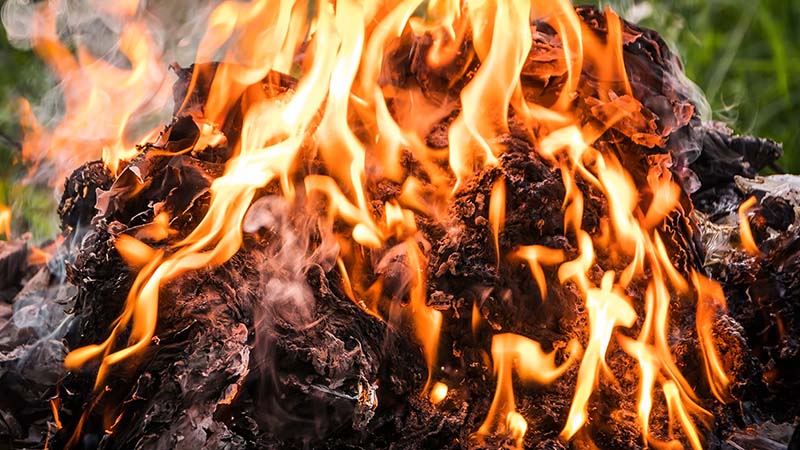Can You Burn Garden Waste?

Burning garden waste might seem like a simple solution when you’ve got piles to clear and no time for tip runs. But while it’s not illegal to have a fire in your back garden, there are laws in the UK that are in place to prevent smoke, smell, or disruption to others.
Smoke from burning can pollute the air and cause health issues and disruptions for neighbours, pets, and wildlife. Even a small fire can create thick smoke that lingers in built-up areas. In most cases, other disposal options are cleaner, safer, and more considerate.
This guide covers how to burn garden waste safely and legally - and explores other ways to dispose of it without harming the environment.
What Are the Rules on Burning Garden Waste and Is It Legal?
Before you burn garden waste in your back garden, it’s important to understand the rules. In the UK, laws are in place to protect public health and reduce pollution. Always check with your local council, as some areas may restrict or ban burning altogether.
Some councils, like Oxford City Council and Adur & Worthing Council, don’t ban garden bonfires outright but state that they must not cause a statutory nuisance. Bristol City Council goes further, recommending that only dry garden waste is burned and advising against doing so on weekends or bank holidays to minimise disruption to neighbours.
Even where burning is permitted, it’s important to consider how smoke may affect air quality and those living nearby. Causing a nuisance or allowing smoke to drift across roads can have serious consequences. Under Section 61A of the Highways Act 1980, allowing smoke to cross a nearby road is a criminal offence if it poses a danger to traffic or causes harm.
It’s also illegal to burn household waste in a way that causes pollution or risks health. This is outlined in the Environmental Protection Act 1990 and the Clean Air Act 1993. Burning is only permitted on private land with the landowner’s permission - never on public land.
If a neighbour is burning waste regularly and it’s affecting your wellbeing, children, or pets, you can report it to your local council. Offenders may face legal notices or fines of up to £5,000.
What Types of Rubbish Should You Avoid Burning in Your Back Garden?

Before burning waste in your back garden, it’s important to know what’s allowed. In the UK, certain types of waste are banned from being burned because they pose serious risks to health and the environment.
The following items should never be burned:
- Plastics or foam packaging (e.g. polystyrene)
- Painted or treated timber
- Rubber, oil-based waste, or leftover paint cans
- Aerosols or chemical containers
Burning plastic waste, in particular, can release toxic chemicals that affect the health of nearby people and animals as well as the environment. These fumes also have a strong smell that can spread quickly — especially in built-up areas and terraced housing.
You’re also not allowed to burn waste from other households, or anything related to business or trade. If you need to dispose of this type of material, you’ll need to apply for an environmental permit.
How To Burn Garden Waste Safely and When To Do It
If you're planning to burn garden waste at home, here’s how to do it safely and responsibly:
- Use only dry, untreated waste: Stick to natural materials like dry branches, twigs, paper, and clean wood. Avoid damp or freshly cut waste, such as green leaves or wet clippings, as they create thick smoke and are harder to burn safely.
- Pick a flat, open area: Choose a location that’s well away from trees, fences, sheds, or anything else that could catch fire.
- Burn in the right conditions: Calm weather with low wind, low humidity, and steady air pressure makes for safer burning. Avoid lighting fires on wet or windy days, as smoke may linger or drift into unwanted areas.
- Check the pile for wildlife: Small animals often take shelter in piles of garden waste, so take a moment to check before lighting a fire.
- Be prepared with safety tools: Keep a bucket of water, sand, or a fire extinguisher nearby in case the fire spreads or becomes difficult to control.
- Consider using an incinerator: A metal incinerator or drum will help contain the fire and reduce the chances of hot ashes/debris spreading the fire.
Alternatives to Burning Garden Waste
When burning isn’t allowed or practical, there are plenty of eco-friendly and hassle-free ways to dispose of garden waste responsibly. Check with your local council, as many offer garden waste collections or composting schemes such as green waste bins. Some other options include:
Compost your garden waste
Composting is a great alternative to burning, letting you recycle garden waste and kitchen scraps like fruit peels, paper, and clippings. Avoid meat or dairy, as they can attract pests. The finished compost works as a natural fertiliser to enrich your soil and support plants.
Bag it up with a HIPPOBAG
HIPPOBAGs offer a flexible way to clear garden waste without needing a skip. Ideal for homes with limited access, these tough, collapsible bags are delivered to your door and collected by crane when full. Just order, fill, and book your collection - it’s that easy.
Get a helping hand with a Man and Van
For heavier loads or when you need extra help, a licensed Man and Van service can do the lifting and disposal for you. Always check that the provider is registered with the Environment Agency to avoid illegal dumping. HIPPO’s licensed services ensure your waste is handled safely and legally.
Clear garden waste with a skip
Working on a large garden job? A skip is a handy way to deal with large amounts of waste. Choose the size you need and allocate a delivery and collection time for when you are able to fill it. If the skip goes on a public road, you might need a permit - most hire companies can help with that.
For other ways to remove garden waste without burning, learn more by visiting our blog and garden waste removal services page.
FAQs
When is the best time of day to burn rubbish in your garden?
There are no set hours for burning garden waste, but it’s best to choose a time that causes the least disruption. Where possible, avoid weekends, bank holidays, sunny days after a long spell of rain, or times when neighbours are in their gardens or have washing out.
Is it illegal to burn garden waste in Scotland?
There are no specific laws in Scotland banning bonfires, but it is an offence if the smoke - or its smell - causes a statutory nuisance. Always check with your local council for rules on burning garden waste. If you’re affected, chat with your neighbour first about your concerns or report it online through your council’s website.

